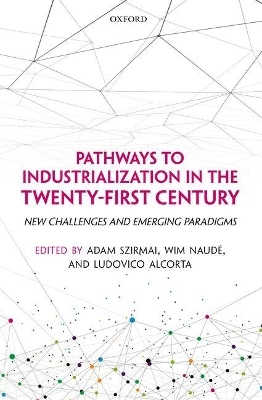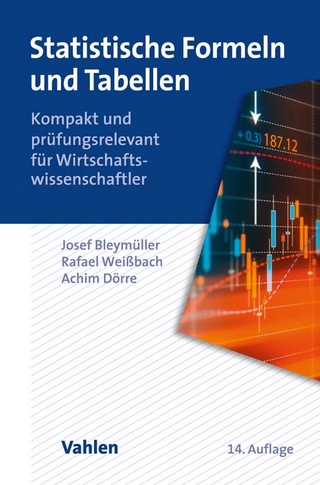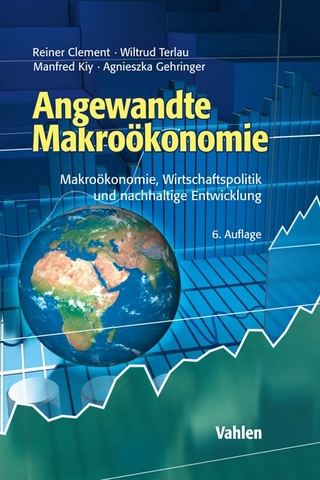
Pathways to Industrialization in the Twenty-First Century
Oxford University Press (Verlag)
978-0-19-880371-3 (ISBN)
Over the last two centuries, the experiences of the first wave of industrialized countries in Europe and the US, and the more recent experiences of the East Asian Tigers, Indonesia, Malaysia, Thailand, China, India, and Vietnam, have illustrated the transformative nature of industrialization. There are reasons to believe that industrialization will continue to be one of the major engines of growth, transformation, and socioeconomic development. Industrial development enables a more rapid advancement toward developed country living standards. But many challenges remain, and new challenges have arisen. These include: integration into global value chains; the shrinking of policy space in the present international order; the rise of the Asian driver economies; new opportunities provided by resource-based industrialization; the accelerating pace of technological change in manufacturing; how to deal with jobless growth in manufacturing; creating adequate systems of financial intermediation; and how to respond to the threats of global warming and climate change.
Under present conditions it may be more difficult than ever for the poorer developing countries to foster industrial development and structural change. They face a more complex, and daunting set of circumstances than the developing countries that embarked on industrialization after 1950. These changing and challenging circumstances require new thinking, and in particular new paradigms to guide researchers, policy makers, and international development organizations in the future.
The book includes chapters on the experiences of Africa, Latin America, China, and Indonesia, as wells as thematic chapters on structural change, jobless growth, the evolution of industrial policy, and the challenges of environmental sustainability and climate change. It provides a timely analysis of the circumstances and challenges facing developing countries in industrialization, and offer fresh ideas for new paradigms to carry forward industrial policy in the future.
Adam Szirmai is Professorial fellow at UNU-MERIT and Professor of Development Economics at the Maastricht Graduate School of Governance of Maastricht University. His research focuses technological change, productivity, and growth in manufacturing in developing countries, and on the determinants of economic growth and stagnation in the long run. His textbook The Dynamics of Socioeconomic Development was published by Cambridge University Press in 2005. A second edition is in preparation. Jointly with Wim Naudé and Micheline Goodhuys, he is editor of the book Entrepreneurship, Innovation and Economic Development, published by Oxford University press in 2011. Wim Naudé is Professor of Development Economics and Entrepreneurship and Vice-Dean at Maastricht School of Management and Professorial Fellow at UNU-MERIT and the Maastricht Graduate School of Management, University of Maastricht. Previously, he was Senior Research Fellow at UNU-WIDER in Helsinki, Professor and director of research at North-West University, South Africa and Research Officer at the Centre for the Study of African Economies, University of Oxford. He is a graduate of the University of Warwick. Ludovico Alcorta is Director of UNIDO's Development Policy, Statistics and Research Branch (DPR). Prior to joining UNIDO Dr Alcorta served as Professor in Economics of Technology and Innovation at the Maastricht School of Management, was a Research Fellow at the Institute for New Technologies, United Nations University and worked as Economist for Latin America at the Economist Intelligence Unit and Midland Bank. He has performed consultancy work for UNCTAD and for UN's Economic Commission for Latin America and the Caribbean (ECLAC). He is also an Affiliated Professor at the Dusseldorf Business School and the Universidad Católica del Peru in Lima.
PART I: INTRODUCTION; PART II: THE NEED FOR AND CHALLENGE OF INDUSTRIALIZATION; PART III: PATHWAYS TO INDUSTRIAL DEVELOPMENT: PAST, PRESENT, AND FUTURE; PART IV: CLIMATE CHANGE AND SUSTAINABILITY; PART V: CHALLENGES TO INDUSTRIAL POLICY; PART VI: CONCLUSION
| Erscheinungsdatum | 12.10.2017 |
|---|---|
| Reihe/Serie | WIDER Studies in Development Economics |
| Zusatzinfo | 41 Figures, 44 Tables |
| Verlagsort | Oxford |
| Sprache | englisch |
| Maße | 155 x 232 mm |
| Gewicht | 696 g |
| Themenwelt | Technik |
| Wirtschaft ► Volkswirtschaftslehre ► Makroökonomie | |
| Wirtschaft ► Volkswirtschaftslehre ► Ökonometrie | |
| Weitere Fachgebiete ► Land- / Forstwirtschaft / Fischerei | |
| ISBN-10 | 0-19-880371-0 / 0198803710 |
| ISBN-13 | 978-0-19-880371-3 / 9780198803713 |
| Zustand | Neuware |
| Haben Sie eine Frage zum Produkt? |
aus dem Bereich


